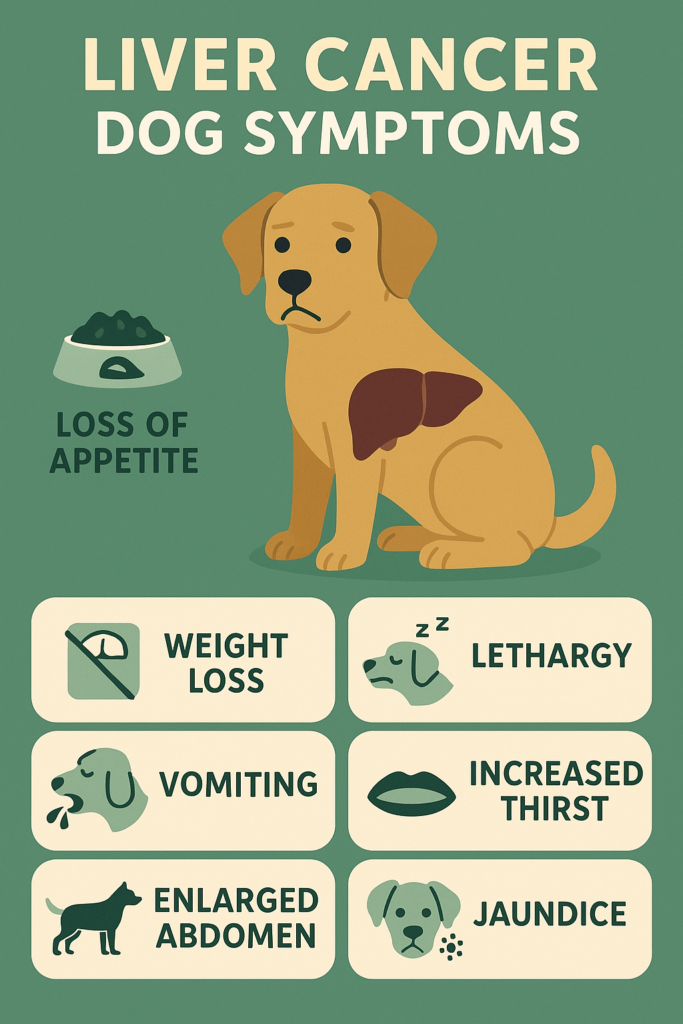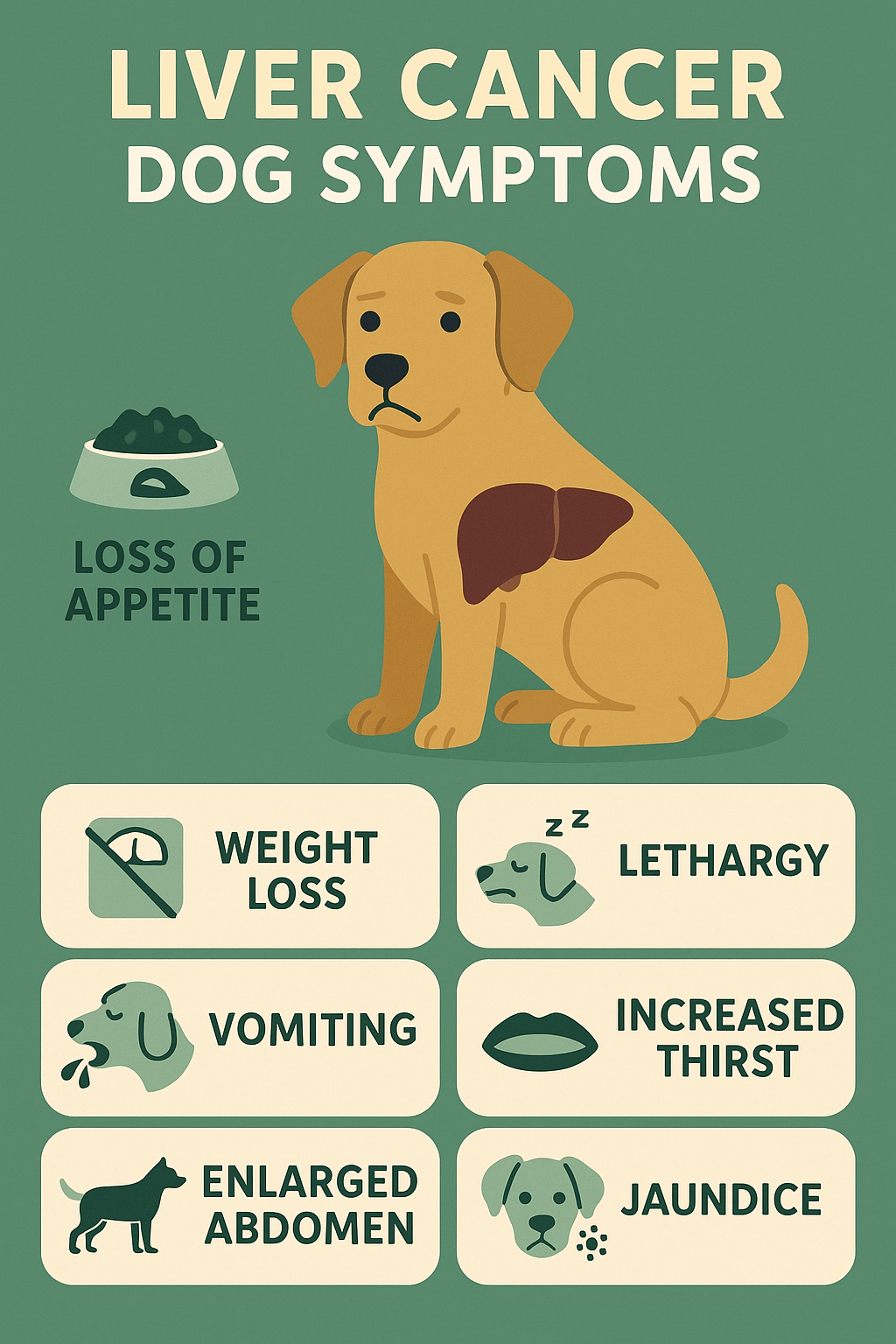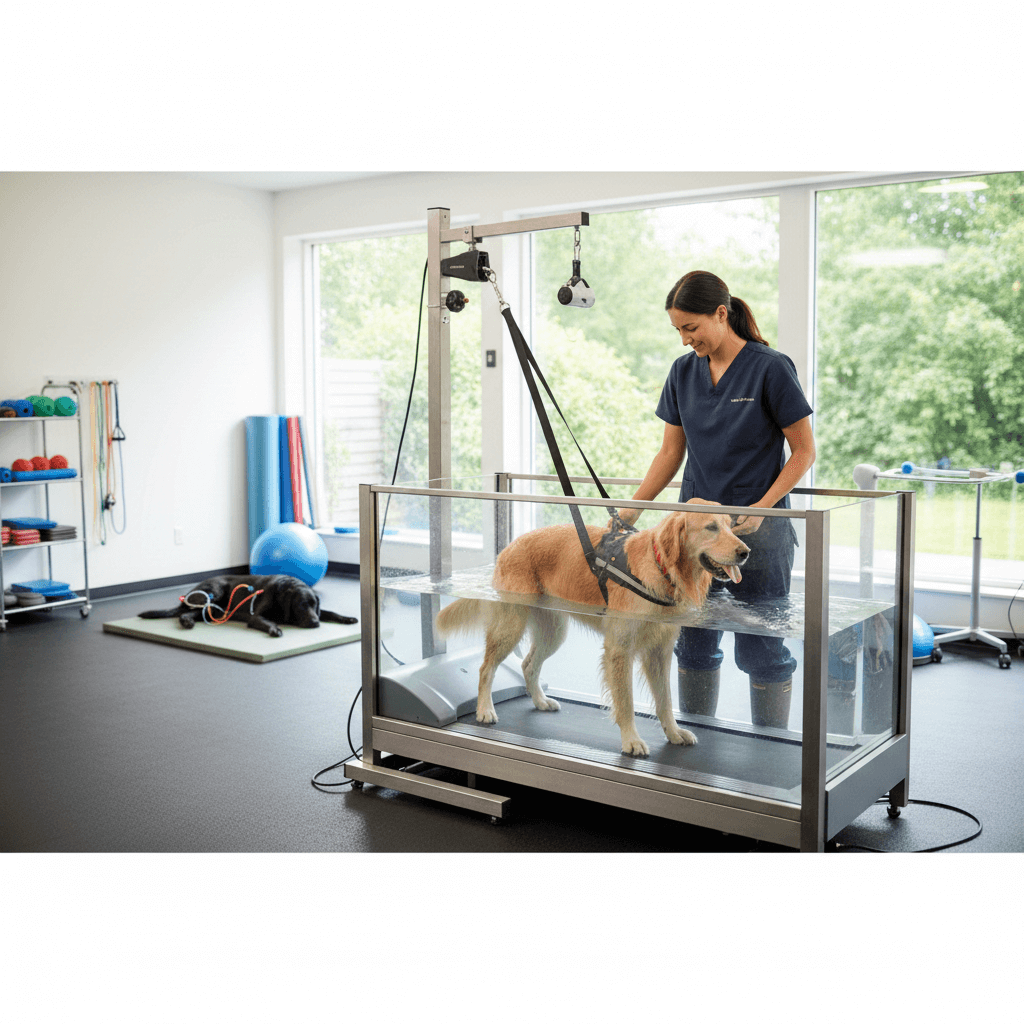Liver Cancer in Dogs: Recognizing the Symptoms Early
Liver cancer in dogs is a serious condition that can significantly impact their quality of life. While it’s not as common as other types of cancer, liver tumors—whether benign or malignant—can cause a range of symptoms that pet owners should be aware of. Early detection plays a crucial role in managing the disease and improving outcomes for affected dogs. Understanding the signs, causes, and treatment options can help you provide the best care for your furry companion. In this article, we’ll explore the symptoms of liver cancer in dogs, discuss diagnostic approaches, and offer guidance on supporting your dog through this challenging time.
Expert Insight: The Connection Between Liver and Gallbladder Cancer in Dogs
“Like many organs, the liver and gallbladder are susceptible to cancer. While a dog can have either liver cancer or gallbladder cancer, the unique location and function of these organs means that many dogs have cancer affecting both organs at the same time.
The liver is an important organ that is involved in metabolism and filtering blood. It produces and stores many important components for digestion and blood clotting. The liver works with the gallbladder, which stores the bile the liver creates for digestion.”
Common Symptoms of Liver Cancer in Dogs
Liver cancer can manifest in various ways, and its symptoms often overlap with other health conditions. Recognizing these signs early can make a significant difference in your dog’s prognosis. Here are some of the most common symptoms to watch for:
Lethargy and Weakness:
Dogs with liver cancer may appear unusually tired or reluctant to engage in physical activities they once enjoyed.Loss of Appetite:
A sudden decrease in appetite or refusal to eat can indicate underlying liver issues, including cancer.Weight Loss:
Unexplained weight loss, even when your dog is eating normally, may signal a problem with their liver function.Jaundice (Yellowing of Skin and Eyes):
Jaundice occurs when the liver cannot process bilirubin properly, causing a yellowish tint to the skin, gums, or whites of the eyes.Abdominal Swelling:
An enlarged abdomen may result from fluid buildup caused by compromised liver function or tumor growth.
If you notice any of these symptoms in your dog, it’s essential to consult a veterinarian promptly for a thorough evaluation.

Behavioral Changes Linked to Liver Cancer
In addition to physical symptoms, liver cancer can also lead to noticeable changes in your dog’s behavior. These shifts often reflect discomfort or pain associated with the disease.
Increased Irritability:
Dogs in pain may become more irritable or snap when touched, especially around the abdominal area.Confusion or Disorientation:
Liver dysfunction can affect brain function, leading to symptoms like confusion, pacing, or difficulty recognizing familiar people or places.Excessive Thirst and Urination:
Increased water consumption and frequent urination may occur due to imbalances in liver enzymes and hormones.Vomiting or Diarrhea:
Gastrointestinal upset, such as vomiting or diarrhea, can indicate liver problems and require immediate attention.Difficulty Breathing:
Fluid accumulation in the abdomen can press on the lungs, making it harder for your dog to breathe comfortably.
These behavioral changes can serve as important warning signs, prompting timely veterinary intervention.
Check this guide 👉Heart Cancer in Dogs: Best 7 Expert Tips!
Check this guide 👉Lung Cancer in Dogs: Best 7 Expert Tips!
Check this guide 👉Understanding Dog Nail Cancer: Best 7 Expert Tips!
Physical Symptoms of Liver Cancer | Behavioral Symptoms of Liver Cancer |
|---|---|
Lethargy and weakness | Increased irritability |
Loss of appetite | Confusion or disorientation |
Weight loss | Excessive thirst and urination |
Jaundice | Vomiting or diarrhea |
Abdominal swelling | Difficulty breathing |
Risk Factors for Liver Cancer in Dogs
Certain factors can increase a dog’s likelihood of developing liver cancer. Being aware of these risks allows you to take preventive measures and monitor your pet closely.
Age:
Older dogs are more susceptible to liver cancer, as their organs naturally decline in function over time.Breed Predisposition:
Some breeds, such as Golden Retrievers and Labrador Retrievers, are genetically predisposed to liver tumors.Exposure to Toxins:
Environmental toxins, including pesticides and certain medications, can damage liver cells and increase cancer risk.Chronic Liver Disease:
Dogs with pre-existing liver conditions, such as hepatitis or cirrhosis, have a higher chance of developing cancer.Poor Diet:
A diet lacking essential nutrients or high in processed foods can strain the liver and contribute to long-term damage.
Understanding these risk factors empowers you to make informed decisions about your dog’s health and lifestyle.
Diagnostic Tests for Liver Cancer in Dogs
If your dog shows signs of liver cancer, your veterinarian will likely recommend several diagnostic tests to confirm the diagnosis and assess the severity of the condition.
Blood Tests:
Blood work can reveal elevated liver enzymes and other abnormalities indicative of liver dysfunction.Ultrasound Imaging:
An abdominal ultrasound helps visualize the liver and identify tumors, cysts, or other irregularities.Biopsy:
A biopsy involves taking a small tissue sample from the liver to determine whether the tumor is benign or malignant.X-rays:
X-rays can detect changes in the size or shape of the liver and rule out other potential causes of symptoms.Urinalysis:
Analyzing urine samples provides additional insights into kidney and liver function, supporting a comprehensive diagnosis.
These diagnostic tools are essential for creating an effective treatment plan tailored to your dog’s needs.
Supportive Care Tips for Dogs with Liver Cancer
Caring for a dog with liver cancer requires special attention to their comfort and well-being. Implementing supportive care strategies can enhance their quality of life and ease symptoms.
Provide a Nutritious Diet:
Feed your dog easily digestible, high-quality food rich in antioxidants and omega-3 fatty acids to support liver health.Ensure Hydration:
Encourage your dog to drink plenty of water to prevent dehydration and aid in toxin elimination.Minimize Stress:
Create a calm environment by reducing noise and avoiding unnecessary disruptions to your dog’s routine.Administer Medications as Directed:
Follow your vet’s instructions carefully when giving medications to manage pain or reduce inflammation.Monitor for Changes:
Keep a close eye on your dog’s symptoms and report any new developments to your veterinarian promptly.
These steps can help your dog feel more comfortable and supported throughout their treatment journey.
Alternative Therapies for Liver Cancer
While traditional treatments like surgery and chemotherapy are standard, some pet owners explore complementary therapies to enhance their dog’s care.
Acupuncture:
Acupuncture may help alleviate pain and improve circulation in dogs with liver cancer.Herbal Supplements:
Certain herbs, such as milk thistle, are believed to support liver function, though consultation with a vet is crucial.Physical Therapy:
Gentle exercises and massage can improve mobility and reduce discomfort in dogs experiencing weakness.Dietary Adjustments:
Incorporating natural, whole foods can complement conventional treatments and boost overall health.Hydrotherapy:
Water-based therapy strengthens muscles and joints without putting excessive strain on the body.
Exploring these alternatives under professional guidance can provide additional relief for your dog.
Coping Strategies for Pet Owners
Dealing with a dog’s liver cancer diagnosis can be emotionally taxing for pet owners. Finding ways to cope ensures you remain strong for your furry friend.
Seek Emotional Support:
Join online forums or local groups where you can connect with other pet owners facing similar challenges.Practice Self-Care:
Prioritize your own mental and physical health to stay resilient during this difficult time.Educate Yourself:
Learn as much as you can about liver cancer to make informed decisions about your dog’s care.Celebrate Small Wins:
Focus on positive moments, such as good days or progress in treatment, to maintain hope and optimism.Plan for End-of-Life Care:
Discuss options like palliative care or euthanasia with your vet to prepare for all eventualities.
By taking care of yourself and seeking support, you’ll be better equipped to provide unwavering love and care for your dog.
Frequently Asked Questions About Liver Cancer in Dogs
What causes liver cancer in dogs?
The exact cause is often unknown, but genetics, toxins, and chronic liver disease are common contributing factors.
Can liver cancer in dogs be cured?
Treatment depends on the type and stage of cancer. Surgery or chemotherapy may help, but a cure isn’t always possible.
How long can a dog live with liver cancer?
Prognosis varies widely; some dogs live months, while others survive years with proper care and treatment.
Is liver cancer painful for dogs?
Yes, it can cause discomfort or pain, particularly if the tumor presses on surrounding organs or tissues.
What can I do to support my dog at home?
Provide a balanced diet, ensure regular vet check-ups, and administer prescribed medications to manage symptoms effectively.
Providing Compassionate Care for Dogs with Liver Cancer
Liver cancer in dogs is a challenging diagnosis, but early recognition of symptoms and proactive management can greatly improve your pet’s quality of life. By staying vigilant for signs of illness, working closely with your veterinarian, and offering plenty of love and support, you can help your dog navigate this journey with dignity and comfort. Remember, you’re not alone—lean on your vet team and trusted resources to guide you through every step of the process. Your dedication and care mean everything to your beloved companion during this time.
Can I Give My Dog Motrin? Best 7 Expert Tips! – Learn why Motrin is toxic to dogs, recognize symptoms of poisoning, and discover safe alternatives for pain relief.
Understanding Dog Rehabilitation: Best 7 Expert Tips! – Discover how targeted therapies and exercises restore mobility, relieve pain, and improve your dog’s quality of life safely.
Can THC Help with Cat Anxiety? Best 7 Expert Tips! – Discover the facts, risks, and safe usage of THC for calming your anxious cat. Always consult a vet first!
What Is Toxic to Cats: Best 7 Expert Tips! – Discover common toxins, recognize symptoms, and learn how to keep your cat safe from harmful substances.





